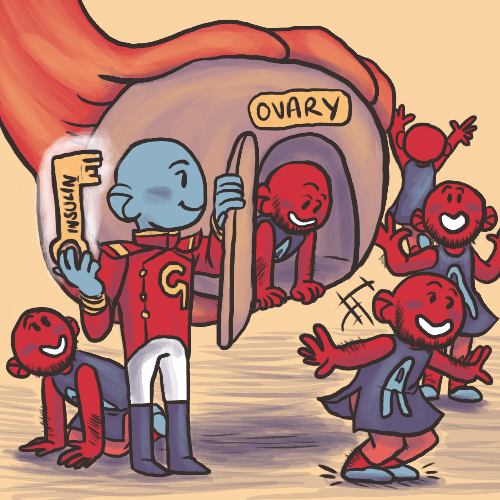The cause of PCOS is multifaceted, and as a result, the medical community is not clear exactly what causes PCOS. What we do know is the elements that contribute to the condition.
Insulin resistance
Insulin is a hormone released by our pancreas in response to sugar (glucose) in our bloodstream, which comes from the food you eat. Insulin acts like a key to the door of our cells, allowing them to take the glucose in and use it as energy.
If you have insulin resistance, it’s like the key doesn’t open the door very effectively and the glucose can’t get inside the cell. This means that your pancreas send out more insulin to try and get the job done. The excess insulin in the bloodstream then stimulates your ovaries to make more androgens. Read more about insulin resistance and PCOS, and how to manage it.

Weight
Being overweight worsens insulin resistance, exacerbating the above picture and worsening the symptoms of PCOS. Insulin resistance also causes excess sugar to be stored as fat, rather than being used for energy, and makes us crave sugar because your body thinks it’s starving.
This presents the key difficulty in losing weight that many women with PCOS experience. Normal weight or lean women can have insulin resistance and PCOS too. Learn the best strategies for losing weight with PCOS.
Diet and lifestyle
Both insulin resistance and excess weight can be caused or worsened by high dietary intake of carbohydrates and sugar, and a sedentary lifestyle.
Genetics
It is thought that both insulin resistance and PCOS itself have a genetic link. Daughters of women with PCOS have a 50 per cent greater chance of developing the syndrome.






